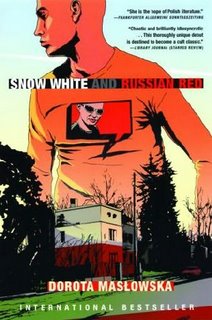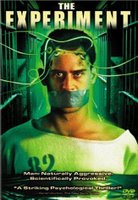snow white and russian red
 This novel by a precocious Polish girl, published when she was only 19, is a kaleidoscopic romp through the mind of a womanizing speedhead kid. But is this a mind you really want to hang out in? The book is filled with dramatic imagery, clever phraseology, and strong prose. In the end, though, it doesn't add up to much.
This novel by a precocious Polish girl, published when she was only 19, is a kaleidoscopic romp through the mind of a womanizing speedhead kid. But is this a mind you really want to hang out in? The book is filled with dramatic imagery, clever phraseology, and strong prose. In the end, though, it doesn't add up to much.I thought this Village Voice review summed it up well:
A precocious, overstimulated punk, Maslowska has become the poster child for her generation of lost, post-Communist Polish youth—who were born too late to have firsthand understanding of the Communist bloc and are now stuck between it and rampant Americanization....And like some teenager squealing their car tires, it might catch your attention but quickly seems pointless. More from the Village Voice:
Maslowska's prose squeals with directionless drive, whizzing like a drug-induced sensory overload: disjointed, formless, unleashed.
It also introduces an otherworld of lasting, unusual imagery. Government workers, like the rose-painting gardeners in Alice in Wonderland, have been ordered to slather the town in thick, flag-inspired red and white bands, house by house, in preparation for No Russkies Day, and to report those who demur. The 70-pound, 15-year-old virgin whom Nails tries to bed vomits fist-sized rocks. Poland's salvation lies in the export of its hottest commodity, Polish sand.True, these are the novel's elements that have stuck in my head. But like the catchy images in many movie previews, there's not a lot more to the book than this.
I'm a bit dumbfounded as to why this novel generated so much press and favorable reviews all around Europe. In the first few pages of the book, larded with salutary reviews from around Europe, one Dutch reviewers is quoted: "She puts a monumental monologue in teh mouth of a provincial, speed-eating, fucked-up youth, that gives a very sharp painting of the actual situation in Poland. Poland is not lost yet."
Apart from the hyperbole, I was hoping the novel would do something like this for me: make sense of the current state of Poland, which I visited briefly last summer. That's a bit much to ask of a Polish teenager, perhaps. I think the book caught in, in part, because people were looking for or happy to see a "Polish novel" that would give them insight into the country, still on the outskirts of political and economic Europe.
But beware these notions of a book that speaks for an under-represented group that has been in the shadows, warns Louis Menand in the New Yorker. Publishing novels is a business, and awards are advertising. Menand's example of a "Maori novel," which has become part of the literary canon and which teachers worldwide now use to represent New Zealand's native culture, reminded me of Snow White. If there weren't so many drugs in it, would it become Poland's face for the world?
 I think another part of the appeal of Maslowska's novel is the voyeuristic shock it will give to some readers. The Village Voice review says:
I think another part of the appeal of Maslowska's novel is the voyeuristic shock it will give to some readers. The Village Voice review says:The novel's effect is not unlike that of Larry Clark's work [his most famous movie was Kids]. You had no idea kids—the characters or Maslowska herself—had seen so much, or were so guileless.But I didn't find it surprising or shocking. It sounded like stuff my friends and I might have written during our stony days of high school, if we'd been more talented and motivated, and maybe done a bit of speed. (Maslowska supposedly wrote the book in a month, half her characters do speed, and her prose is compared with Jack Keroauc, whose stream-of-consciousness writing was definitely speed-fueled.... Hmm.)
Anyway, I hope Maslowska keeps writing and I might pick up her next book. But I won't recommend this one to anyone. Irvine Welsh's portrait of the drugged-up Scottish underclass in Trainspotting was far more captivating and convincing.













0 Comments:
Post a Comment
<< Home